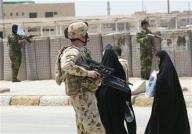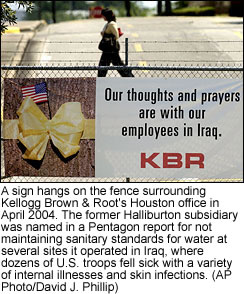|
Iraqi Shia leader wants to disband Mahdi army
Watch: Iraq Surge report presented to politicians
The document, which was written a month ago and is and marked “secret” and “sensitive”, is intended to replace the United Nations mandate for coalition troops, including British forces, to remain in Iraq, which expires at the end of the year.
The draft authorisation would allow for the US to “conduct military operations in Iraq and to detain individuals when necessary for imperative reasons of security”.
It does not set a time limit, but describes the arrangement as temporary and points out that the US does not want “permanent bases or a permanent military presence” in the country. It also states that the US does not seek to use Iraq as a base to launch operations against other states.
The draft agreement is unlikely to emerge unscathed from political scrutiny in Baghdad or Washington. There appears little appetite in the US for a drawn-out occupation of Iraq. In Baghdad, both Shia and Sunni political groups opposed to the American presence are likely to oppose the agreement in its draft form.
Moqtada al-Sadr, a vocal critic of the occupation, said yesterday that he would consider disbanding his powerful Mahdi army – but only after consulting the ayatollahs, or religious leaders.
Iraq’s prime minister, Nouri al-Maliki, said that if the militia, which has battled American and government forces in Basra and Baghdad for the past two weeks, was not disbanded its political wing would be barred from provincial elections.
“They no longer have a right to participate in the political process or take part in the upcoming elections unless they end the Mahdi army,” said Mr Maliki.
Sadr said he would consult religious figures, including Grand Ayatollah Ali al-Sistani, the moderate Shia leader who is revered as a “source of emulation”.
By putting the fate of his powerful militia in the hands of the religious hierarchy, the cleric appears to be gambling that he will establish his credentials as a figure capable of unifying Iraq’s majority Shia community under his leadership.
However, Sadr said ayatollahs in the Iranian city of Qom, home to his spiritual mentor Grand Ayatollah Kazim al-Haeri, a known hard-liner, would also have a say.
The cleric’s supporters will tomorrow attempt to mount a “million-strong” march in Baghdad to mark the fifth anniversary of the city’s fall. It will follow a report on Iraq to the US Congress in Washington by General David Petraeus and Ryan Crocker, the ambassador to Baghdad.
By Damien McElroy
Last Updated: 2:10am BST 09/04/2008
Source: Telegraph
|


